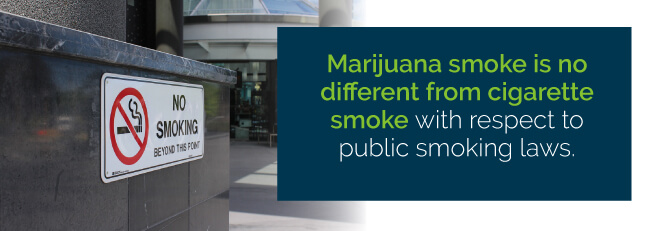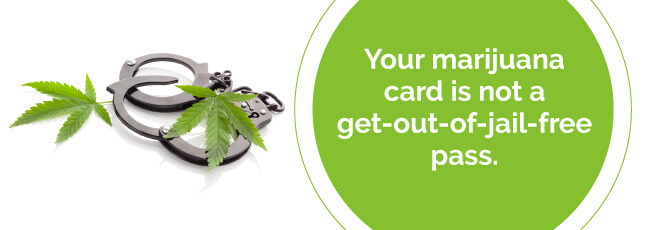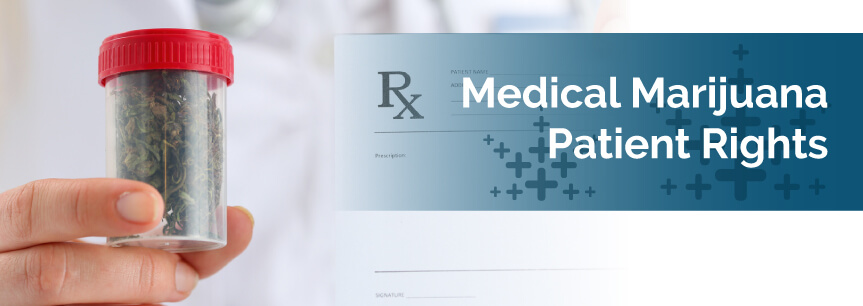Medical marijuana use is still a controversial topic with some parts of the general public. People hold their beliefs about drugs based on old ideas or propaganda, and they can be reluctant to change with the times. It’s hard for some people to accept the new information available now concerning the medical uses and benefits of marijuana.
Even the laws concerning marijuana use can be difficult to understand and interpret. According to the Federal Drug Agency (FDA), marijuana is still a highly controlled and illegal substance. But in many states across the country, it is legal for doctors to prescribe cannabis to their patients. In a few states, it’s even legal to use marijuana for recreational purposes.

If you want to take advantage of the benefits of medical marijuana to relieve your symptoms or ease your pain, you have a right to do so. Understanding your rights as a patient who is prescribed cannabis will make it easier to live your life and protect your health at the same time.
Rights of Medical Marijuana Patients to Travel
Using cannabis at home to ease your symptoms can be fairly easy. You follow the instructions of the marijuana doctor who prescribed the cannabis for you. You obtain your marijuana at an approved facility, and you brief everyone in your household about your medical need to consume marijuana.
We are a transient culture, however, and we’re in the habit of moving around. You want to visit friends and family in other towns or other states. Your life is not complete just sitting at home, but without your medical marijuana, you can’t be truly comfortable. You have a right to consume your prescribed marijuana wherever you go. It is a good idea to take some precautions, though. Here are some tips for traveling with marijuana:
- Know the law in your state with respect to how much marijuana a person can legally carry. If you’re traveling within your own county, you should have no problems — but check the limits in neighboring counties before venturing too far.
- Never travel anywhere with marijuana plants. Transporting plants of any sort is a practice that draws attention because it’s restricted in most locations. It is best to leave marijuana plants where they are and only carry the usable product in approved amounts.

- For long trips, consider getting dispensary privileges where you will be staying. It may be impossible to carry enough cannabis to supply you the entire time you’re away. Check with your dispensary — they may be able to help you obtain additional medical marijuana when you arrive at your destination.
- Being legally registered in your home state will not help you if you travel to a state that does not allow medical marijuana. Even if your final destination is a state where medical marijuana is legal, passing through a non-legal state could be problematic. It’s best not to transport marijuana across state lines, and instead obtain what you need when you arrive at your destination.
- When you travel to another state that recognizes your medical marijuana card, you will likely be expected to register in that state, as well. Your medical marijuana doctor or home dispensary should be able to help you get registered.
- Private transportation companies are not required to recognize the validity of a medical marijuana card. Their employees are bound to follow company policies that may include removing passengers in possession or under the influence of any substances. Traveling in your own private car is the safest way to go if you’re bringing your medical marijuana with you.
- Airports operate under federal laws, which prohibit the use or possession of marijuana. Your medical marijuana card will not be recognized at the airport. If you try to fly with cannabis, your drugs can be confiscated and you can be detained or arrested.

If you do some research and plan your trip carefully, you can travel without any problems. It’s important to recognize that your rights as a medical marijuana patient are highly dependent on location. As you move around the country, you will encounter different laws and attitudes concerning treatment with cannabis. It’s best to abide by all local regulations.
Patients’ Rights and Your Right to Work
While most employers have a prohibition on drinking alcohol or coming to work under the influence, explicit or unspoken, many do not have a drug policy that specifically deals with cannabis. Workplaces that do random or frequent drug testing, though, pose a bit of a problem for medical marijuana patients.
Unlike alcohol, marijuana can remain in your system for several days. If you use marijuana at home on a Friday night, it could still be detected by a drug test on Tuesday morning. Like other aspects of medical marijuana use, hiding it from your employer may not be a good approach.
As a registered medical marijuana patient, you have a right to consume marijuana treatment. In many cases, though, your employer has a right to prohibit the use or possession of that and any other substances on the premises. Then, there’s the question of the residual effects, which they will know about if drug tests are a regular occurrence.
The best approach to medical marijuana use and employment may be a case-by-case basis. If your employer does not drug test and does not seem to mind consumption at work, you might just be able to ignore the issue. However, if your employer is likely to find out you use medical marijuana, you’re almost certainly better off delivering the news yourself.

You may have to educate your employer about the medical marijuana registry system, show him your marijuana card and explain what that means. It does not mean that you have the right to smoke pot at work, but if you explain the modifications you need to be productive at work, your employer may be willing to accommodate you.
There are many employers in this country who are not concerned about marijuana use at work. You may want to consider researching job openings and smaller, more compassionate companies in your area. Your need for medical marijuana treatment should not interfere with your ability to earn a living.
Avoiding Unnecessary Issues
Although you’re a registered marijuana user and your cannabis is prescribed by a medical doctor, you could still run into legal trouble. The federal law is in conflict with many state laws on the issue of marijuana, and who chooses to enforce which law at any given time can be confusing.
It is possible to avoid any unnecessary issues by following a few key steps:
- Always obey no-smoking regulations. Marijuana smoke is no different from cigarette smoke with respect to public smoking laws. Smoking is prohibited on school property, on school buses, in public buildings and in a number of other areas. Be aware of the smoking laws in your community and do not violate them.

- Never use marijuana in your car or while driving. There is a risk of impairment, even if you are a regular cannabis user. Smoking marijuana in your car, even while it’s parked, can draw negative attention. If you are pulled over for a moving violation, the odor of cannabis smoke might be detected if you have ever smoked in your car, and this would be probable cause for further investigation.
- Be discreet and do not draw attention to yourself or your home if you use marijuana therapy. Any behavior that would cause your neighbors to call the police, like loud fighting or music playing late at night, could invite unnecessary scrutiny. Once the police come to your house, they may find it easy to establish probable cause to search. If your marijuana is found, you could face charges.
- Your marijuana card is not a get-out-of-jail-free pass. Even though you’re following a legal system, it’s not a good idea to flaunt your medical marijuana use. Following your doctor’s orders for marijuana therapy is not wrong, but the use of marijuana is still controversial in many places. If you give the authorities a reason, they can find a violation to charge you with.

- Avoid property searches. If you’re pulled over in your car, the police come to your house or an officer of the law approaches you on the street, you have the right to refuse a search of your vehicle, your bag or your person. Never give your consent for a search. When asked, you may politely state that you do not consent to a search. Be firm, but be polite. Understand that there may be consequences for your refusal, but it’s better than handing over potential evidence against yourself.
- Be smart in handling search warrants. A search warrant gives the police legal permission to conduct a search. Before letting them enter the premises, verify the particulars on the search warrant, including the date and the judge’s signature. Generally, anything they find in plain sight might give cause to expand the search area. Do not give the police access to anything that is not specifically described in the search warrant. State your objection to the search so anything they find might later be thrown out as evidence against you.
- Protect your right not to incriminate yourself by limiting casual conversation with police officers. When questioned about anything, ask if you’re being detained. If you are not detained or arrested, calmly exercise your right to walk away without further conversation. If you are arrested, exercise your right to remain silent until you can see an attorney.
Attitudes toward cannabis use, even for medical purposes, are beginning to relax. It will take some time, however, for the laws to catch up. This process can be helped by the cooperation of marijuana patients who follow the law to the best of their abilities. By avoiding unnecessary issues with your marijuana use, you can continue to benefit from its positive effects on your health.
Patient Privacy Laws
Part of becoming a medical marijuana patient means being registered in the state database. This is a necessary step for states to monitor who is using marijuana, who is prescribing marijuana and who is dispensing it. Some states also use the database to track the effectiveness of treatments on various conditions.
Patient medical information is protected under the Health Insurance Portability and Accountability Act of 1992 (HIPAA). This federal law strictly limits who can have access to your health information, reducing the chances of discrimination in employment or services based on your medical condition. All medical doctors and other healthcare professionals are required to abide by HIPAA regulations. Even medical testing facilities need your written consent to report their findings to your doctor.

Since your marijuana treatment is prescribed by a medical doctor, it’s covered by HIPAA and should remain private information. The dispensary is also required to abide by HIPAA in filling your prescription and communicating with any third parties in the transaction. Dispensaries cannot, for instance, tell their growers who they’re providing product to.
The marijuana patient registries also fall under HIPAA regulations, but they widen the circle a bit. Some of the information in these databases constitutes confidential health information. It is available to members of the state health department who need access in order to perform their duties. Access to the marijuana registry is also available to law enforcement who can use it to verify the authenticity of a marijuana card they are presented with.
Your right to use medical marijuana in most states is based on your cooperation with the registry system. Submitting to registration in the marijuana database earns you the right to receive a prescription for cannabis from a qualified physician.
The Right to Grow Your Own
New marijuana laws in various states attempt to control the growth and production process. In most states where marijuana is legal in some capacity, the right to grow is limited to medical purposes and not recreational. Commercial growing and production operations are strictly regulated in all states where they exist.
With proper registration, a medical marijuana patient can grow a limited amount of pot for their own consumption. Presumably, they will produce the amount their doctor prescribes and not need to visit a dispensary. Exercising this right may be more complicated than practical, however.
For marijuana treatment to work and not produce unpleasant side effects, it needs to be controlled by your marijuana doctor. Working with registered dispensaries of medical marijuana, your doctor can help you pinpoint the exact amount and form of cannabis that works best for your situation. The way you consume the marijuana can be tailored to your medical needs and your lifestyle.
Medical marijuana is available commercially in a number of different forms. The cannabis is bred for a certain balance of ingredients and cultivated for consistency. There are 779 different types of cannabis plants. Each has different uses and side effects. Commercial producers make it possible for your doctor to prescribe a specific blend for you.

In addition to the different plant varieties, marijuana is available in several forms. Edibles and tinctures are two you’ve probably heard of, but there are many others. Each form of marijuana has benefits for certain conditions. Tinctures are fast-acting, for example, while edibles last longer and can be more concentrated. Your doctor will work with you to identify the form of marijuana that fits your condition and lifestyle best.
While it’s your right to grow your own medical marijuana, it might be in your medical best interest to get your stash from a dispensary. The commercial medical growing and production operations are far more sophisticated than home-growing facilities. They have all the medical technology they need to produce a substance that’s safe and effective.
Exercising Your Marijuana Patient’s Rights
Marijuana laws are changing rapidly across the country, while attitudes about marijuana use in some areas change rather slowly. For the foreseeable future, Americans will be governed by a set of contradictory and often arbitrary laws about medical marijuana. As a marijuana patient, it’s up to you to know and exercise your rights for the betterment of your own health.
Here are some things to keep in mind about your rights as a medical marijuana patient:
- Follow your doctor’s instructions about your marijuana treatment. The medical community will be on your side if you work with them. Tell your doctor if you have any concerns about your treatments or if you would like to make a change to your prescription.
- Maintain your registration in the marijuana database in good standing. Allow your doctor to share any necessary information with the registry to ensure your use of cannabis is properly documented to health authorities.
- Always carry your marijuana card with you. Your right to possess marijuana may not be recognized in every jurisdiction, but presenting your card will give your claim some legitimacy.
- Know the laws in your area concerning the use and possession of marijuana for medical purposes. Read any updates that come from your state health department and ask questions if you’re confused.
- Keep your family and employer informed about your status as a medical marijuana patient. Knowing that you use marijuana and the extent to which it helps you can garner sympathy and avoid surprises. Educating the people closest to you will give you some advocates when and if you need them.

- Research medical marijuana laws before you travel. Use your medical network to get the information you need about places you plan to visit or even travel through. Your marijuana doctor, the dispensary you use and even the health department in your state should be able to help you understand the safest way to travel and accommodate your need to use medical marijuana.
- When confronted with a legal issue, remain calm and polite. As a medical marijuana patient, you could be on uncertain legal ground. Do not exacerbate your situation by making demands or challenging authorities. Present your marijuana card, but do not offer additional information until your lawyer is present. Understand that the authorities might be in a difficult situation trying to enforce conflicting laws. Empathy will get you a lot further than hostility.
- Treat your medical cannabis like you would any other prescribed drugs. Never share your marijuana or take someone else’s. Always follow your doctor’s exact dosing recommendations. Report any unusual effects or conditions to your prescribing doctor right away.
When you become a medical marijuana patient, it’s not a bad idea to establish a relationship with an attorney in your area. An initial consultation to discuss your status as a marijuana user can provide guidance about how to avoid unnecessary issues. You’ll also know who to call if a legal problem arises.
Learn More at MarijuanaDoctors.com
Having rights as a medical marijuana patient and exercising those rights can be tricky. Laws vary by state and, in some cases, by county. It’s a good idea to have professional guidance in the area of medical marijuana.
To become a marijuana patient, use our website to search for a medical marijuana doctor near you. We can put you in touch with a doctor who’s experienced at prescribing marijuana treatment and knows how it can help cope with certain conditions. We also have a list of marijuana dispensaries you may find convenient.
Visit our website today to start building your network of professional, discrete and thoroughly vetted marijuana providers!
Save






